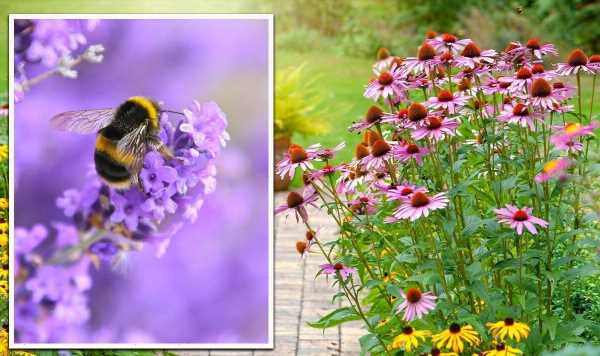Princess Anne hosts veterans’ garden party in Queen’s absence
We use your sign-up to provide content in ways you’ve consented to and to improve our understanding of you. This may include adverts from us and 3rd parties based on our understanding. You can unsubscribe at any time. More info
Gardens play a crucial role in encouraging wildlife production, as the plants, flowers and even your weeds provide bees and various other pollinators with the nectar to live well and thrive. Growing a bee-friendly garden is easier than you might think, and it also doesn’t mean you need to spend extortionate amounts on exotic flowers, either.
The UK is reported to have lost 13 species of bee, and a further 35 are considered under threat of extinction if we don’t do more to preserve them.
By growing a more bee-friendly garden, you’ll be able to help contribute to the urgently required mass repopulation – and even better – most of the plants best-suited are actually the most low-maintenance of all.
The grander “flowers within flowers”, such as double peonies, tend to present bees with a much harder challenge of accessing pollen, and many of them are hybridised plants.
They’re bred more for aesthetic purposes and don’t tend to seed and produce enough pollen.
Bees are attracted to their bright colours, but they won’t actually get their proper fill of nectar.

Instead, to really grow a garden good for the bees, you should opt for the more simplistic foliage – but this doesn’t mean a bland garden.
Here are five beautiful but low maintenance plants you can grow to encourage wildlife in your garden.
Lavender
Lavender is a haven for bees; it’s believed they can see purple better than any other colour.
These hardy and drought-resistant shrubs are rich in nectar, come in a variety of shades and can be left to grow all year round.

The highly bred varieties, including grosso, gros blue, and hidcote giant are said to be most attractive to bees, so try and get your hands on those ones if you can.
Wallflowers
Wallflowers are known to flower all year round, making these another effective option to grow when hoping to boost bee production.
They’re small and compact, but very high in nectar; so if you have a smaller garden, this could be a perfect solution.
Like lavender, these robust plants are also great for beginners as they’re low maintenance and don’t require too much water.
DON’T MISS:
How to get rid of snails from your garden – 6 easy and natural methods [EXPLAINED]
How to upcycle garden furniture: Six top tips to refresh your garden [INSIGHT]
Natural ways to get rid of ‘common’ garden pests including wasps [ANALYSIS]

Buddleja
As we quickly approach summer, these flowering bushes would be great to plant in your garden.
The conical blooms are known to attract all kinds of pollinating insects, including bees. They grow fast and tend to bloom in late summer, displaying a mass of showy flowers to really brighten up your garden as summer draws to an end.
The mint family
Bees love all herbs, but herbs from the mint family are a particularly good option when planning your bee-friendly garden.
As well as lavender, the mint family includes classics like mint, basil, sage, oregano, rosemary, and thyme, and are known to be crowd-pleasers for pollinators.
Depending on which you choose, these will generally bloom from early spring through to late winter, providing continuous pollen and nectar.
By planting a few of these around your garden, you’ll not only feed the bees, but you can also reap the benefits with good food seasonings or tea additions.
Sedum
As bee colonies tend to decline further during the period of mid to late summer, bees are even more under pressure to source food for the winter months.
Sedum can save the day, as it tends to flower from September, and fortunately, they’re also very easy to grow and look pleasant in groups.
Its flowers are very easily accessible for bees, and they’re also incredibly attractive to butterflies – so if you want more of those in your garden, sedum is a great option.
Source: Read Full Article
